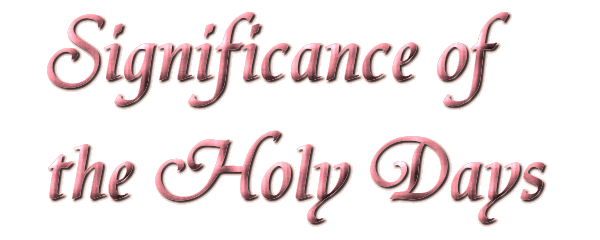
 |
 God's new year begins in the spring,
with the first month of the Jewish calendar being Nisan. The
first annual Holy Day is Passover or Pesach which falls every year on the 14th of
Nisan.
God's new year begins in the spring,
with the first month of the Jewish calendar being Nisan. The
first annual Holy Day is Passover or Pesach which falls every year on the 14th of
Nisan.
Passover
Leviticus 23:5
In the first month, on the fourteenth of the month, between the two evenings, is
the Passover to Jehovah.
The date for Passover is different each year in the Roman
calendar, which is what most people follow.
Passover was celebrated first in the land of Egypt with the blood of the sacrificial lamb in order to preserve the Israelites from the plague that afflicted Egypt with the death of every firstborn (Exodus 12:6-14), and they continued celebrating it at its appointed time every year.
One of the requirements of the passover was that no bone of the lamb could be broken, and whatever was left uneaten had to be buried or burned before daybreak of Nisan 15.
Numbers 9:12
They shall leave none of it
until morning, nor break a bone of it; according to all the statute of the
Passover they shall observe it.
This Passover festival pointed to a late fulfillment with Yeshua/Jesus, the Lamb of God, the Messiah, that was sacrificed for our sins. Yeshua fulfilled the requirements of the Passover -- He died on Passover night, none of His bones were broken, and His body was buried before daybreak.
Jesus told us to continue to celebrate Passover in His name eating the unleavened bread (His body) and drinking the wine (His blood) (Luke 22:19).
Feast of Unleavened Bread
The week from Nisan 15 to Nisan 21 is called the Feast of Unleavened Bread. The first and last days of this week (Nisan 15 and Nisan 21) are holy convocations to the Lord, (Sabbaths), no servile work can be done. This is a celebration of the Exodus from Egypt.
Before the week of Unleavened Bread (Chag HaMatzot) starts, we must clean our houses, taking away anything that has leaven. Symbolically this represents taking sin out of our lives.
|
|
Leviticus 23:6-8 Then on the fifteenth day of the same month there is the Feast of Unleavened Bread to the LORD; for seven days you shall eat unleavened bread. On the first day you shall have a holy convocation; you shall not do any laborious work. But for seven days you shall present an offering by fire to the LORD. On the seventh day is a holy convocation; you shall not do any laborious work. |
Pentecost
The next holiday in the Jewish calendar is Shavuot or Pentecost which also had an early and late fulfillment. The early fulfillment celebrated the firstfruits of harvest.
The late fulfillment was the firstfruits of Christian converts which received the holy spirit. The holiday occurs fifty days after the Sabbath following Passover. Therefore this holy day falls on a different day each year and must be counted. In the Roman calendar, which is the one everybody goes by, Shavuot falls around the month of June and always on a Sunday.
Leviticus
23:15
And ye shall count from the morning after the Sabbath, from the day that ye
brought the sheaf of the wave-offering, seven weeks; they shall be complete;
Leviticus 23:16
even unto the morning after the seventh Sabbath shall ye count FIFTY days; and
ye shall present a new oblation to Jehovah.
| Fifty days after the weekly Sabbath following the crucifixion of Jesus, a multitude of believers were gathered at the Temple in Jerusalem when suddenly the holy spirit came upon the apostles of Jesus/Yeshua in the form of tongues of fire coming from their heads. This was the late fulfillment of Pentecost. |
|
Acts 2:1-4
"And when the day of Pentecost was fully come, they
were all with one accord in one place and suddenly there came a sound from
heaven as of a rushing wind, and it filled all the HOUSE where they were
sitting. And there appeared to them cloven tongues like fire and it rested upon
each of them and they were all filled with the Holy Spirit, and began to speak
with other tongues, as the spirit gave them utterance."
The word translated "HOUSE" refers to God's holy Temple. The apostles were assembled in the Temple as it was required of all males during Pentecost.
Rosh Hashanah
The next festival after Pentecost is Rosh Hashanah, which is also called "the Jewish new year" which occurs on the 1st of the month of Tishri, the SEVENTH month of the year according to God's calendar. On Jewish calendars, Rosh Hashanah is considered to be the first holiday of the year, as Tishri is the first month of the year, despite the fact that this does not follow the biblical sequence.
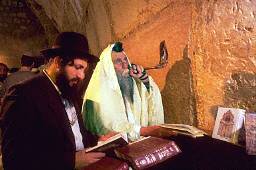 |
In the Roman
calendar, Rosh Hashanna, also called Feast of Trumpets, falls in the autumn,
around the month of September.
Leviticus 23:24 |
The true meaning of Rosh Hashanah is not well understood by many, and its significance argued. It follows with the "10 days of awe" and with the Day of Atonement or Yom Kippur, the most holy of holidays. Atonement means "at one with God". The 10 days of awe are in preparation for Yom Kippur; this period of 10 days is a time to make peace with enemies, repent and ask forgiveness for our wrongdoings.
Yom Kippur
| On Yom Kippur we now seek forgiveness from God, hoping that we may be inscribed in the book of life. This implies resurrection and judgment, not reincarnation. We pray and fast on Yom Kippur to be able to be "one with God". Many donít shower, donít wear perfume or lotions and donít have sexual intercourse. This is not biblical, but appropriate, considering it is a solemn day where we are seeking Godís forgiveness, not our own pleasures. |
|
Once the day of Yom Kippur is over at sunset, the book is closed and our opportunity to be inscribed in the book of life is passed for that year.
Leviticus 23:27
Only -- on the tenth of this seventh month [is] a day of atonement; you shall
have a holy convocation, and you shall humble yourselves, and offer a
fire-offering to Jehovah
Leviticus 23:28
and you shall do no work in this self-same day, for it [is] a day of atonement,
to make atonement for you, before Jehovah your God.
Leviticus 23:29
For any person who is not humbled in this self-same day shall be cut off from
his people
Leviticus 23:30
and any person who does any work in this self-same day I shall even destroy that
person from the midst of his people;
Leviticus 23:31
You shall do no manner of work. [It shall be] a statute forever throughout your
generations in all your dwellings.
Leviticus 23:32
It [shall be] to you a Sabbath of rest, and you shall afflict your souls in the
ninth [day] of the month at evening: from evening to evening shall you celebrate
your Sabbath.
Feast of Tabernacles
The next annual holy day that follows is Sukkot, or the Feast of Tabernacles, literally meaning "feast of temporary dwellings." Sukkot is a seven day celebration, in which the first and last days are considered Sabbaths.
Leviticus 23:34
Speak unto the children of Israel, saying, The fifteenth day of this seventh
month [shall be] the feast of tabernacles [for] seven days unto YHWH.
Leviticus 23:39
In exactly the
fifteenth day of the seventh month, when you have gathered in the crops of the
land, you shall celebrate the feast of YHWH for seven days, with a rest on
the first day and a rest on the eighth day.
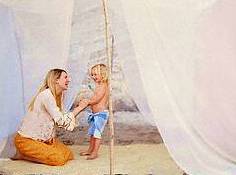 |
The celebration calls for construction of a Sukka, a temporary dwelling made out of a movable material. Some people use tree branches, with a roof made of any material of vegetable origin. You are to spend your time in the Sukka, eating and sleeping there as a remembrance that our life on this Earth is temporary. |
Leviticus 23:40
Now on the first day you shall take for yourselves the foliage of beautiful
trees, palm branches and boughs of leafy trees and willows of the brook, and you
shall rejoice before YHWH your God for seven days.
Leviticus 23:42
You shall dwell in booths seven days; all that are Israelites born shall dwell
in booths:
Leviticus 23:43
That your generations may know that I made the children of Israel to dwell in
booths, when I brought them out of the land of Egypt: I [am] YHWH your God.
| After escaping from Egypt, the Israelites dwelt in tents or booths for 40 years as they wandered through the desert in pursuit of the promised land. God once again wished to separate the Hebrew people in the same way he originally separated Abraham, to their own land, a place where they would be free to worship the one true god, but in order to do that, God needed to train them for 40 years. | 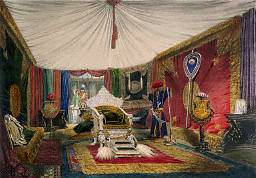 |
|
|
The Israelites did not build houses in the desert, they lived in booths (tabernacles or temporary tents), moving the tents and the sanctuary with the ark of the covenant which contained inside it the ten commandments as they moved from place to place. This was to teach them that they should be looking towards another place, the land of Israel, because Sinai was not the promised land. |
The intention of a temporary place in the desert was to train that generation into following YHWH -- something the Israelites in Egypt had departed from. God spelled it out into written commandments to teach them the right way of living, and how God was going to provide for all their needs.
Deuteronomy 8:2
You shall remember all the way which Yahweh your God has led you these forty years in the wilderness, that he might humble you,
to prove you, to know what was in your heart, whether you would keep his commandments, or not.
Deuteronomy 8:3
He humbled you, and allowed you to hunger, and fed you with manna, which you didn't know, neither did your fathers know; that he might make you know that man does not live by bread only, but by everything that proceeds out of the mouth of Yahweh,
Deuteronomy 8:4
Your clothing didn't grow old on you, neither did your foot swell, these forty years.
Deuteronomy
8:5
Thus you are to know in your heart that the LORD your God was disciplining
you just as a man disciplines his son.
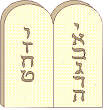 |
Deuteronomy 8:6 Therefore, you shall keep the commandments of YHWH your God, to walk in His ways and to fear Him. |
What is the late fulfillment of these Holy Days? Why do we continue to celebrate Sukkot? Is it just in remembrance of these events? What about Rosh Hashanah and Yom Kippur? What are the events that they foretell, and when will they come to pass?
It is important to realize that these last holidays of the year are SEQUENTIAL in occurrence, and the correct sequence is in the bible (Leviticus 23). We have already seen the fulfillment of Passover and Pentecost, however we are still waiting for the fulfillment of the rest of the holidays.
Future Fulfillment of the Holy Days
We believe:
![]() Rosh Hashanah
is a call to repentance of sins. The sound of the shofar during this day
should remind you that you are being judged to see if you deserve to go in the
rapture. Remember that from the 10
virgins, half left with God and half were left behind.
Rosh Hashanah
is a call to repentance of sins. The sound of the shofar during this day
should remind you that you are being judged to see if you deserve to go in the
rapture. Remember that from the 10
virgins, half left with God and half were left behind.
![]() The 10 days of awe are a period of time
between Rosh Hashanah and Yom Kippur; during this time God decides if you
deserve to be written in the book of life; He will check to see if you are
obeying His commandments.
The 10 days of awe are a period of time
between Rosh Hashanah and Yom Kippur; during this time God decides if you
deserve to be written in the book of life; He will check to see if you are
obeying His commandments.
![]() Yom Kippur
is the end of the ten days of awe. At that time, God will determine if you go in
the rapture or should be left behind.
Yom Kippur
is the end of the ten days of awe. At that time, God will determine if you go in
the rapture or should be left behind.
The Christians who remain on this Earth after the rapture will have to endure the events that the Bible describes in the Book of Revelation, mainly the hardships due to the plagues that fall on the earth during the wrath of God, and the persecution of the one-world government of "the beast".
|
|
The root SKH, from which sukka and sukkot are derived, means to cover and protect. Living in the sukka means living in the hands of God, under God's protection.
Future Fulfillment of Symbols
1 The Shofar. The shofar, a ram's horn, is sounded during Rosh Hashanah. A ram's horn was used in the past to alert people for war, to call upon God for deliverance, and for celebrations.
 |
Future fulfillment: This is symbolic of "The Watcher" alerting the people of God that our deliverance is at the doors, that the rapture is imminent (Isaiah 52:8, Matthew 25:6). |
2 The Exodus. The exodus of the people of Israel to their promised land.
Future fulfillment: This is symbolic of the exodus when the Messiah returns for the rapture (Matthew 24:40).
| 3 The Egyptian Pharaoh. The people of Israel fled the Egyptian Pharaoh at the time of the Exodus. |
|
Future fulfillment: The prophetic"woman" flies away from Satan at the time of our exodus and rescue (the rapture).
| Revelation 12:14 And to the woman were given two wings of the great eagle, that she might fly into the wilderness, into her place, where she is nourished for a time, and times, and half a time, [away] from the face of the serpent. See Woman |
|
4 Dwelling in Tabernacles. Dwelling in tabernacles in a scarcely populated region for one generation during the time of Moses.
Future fulfillment: The same thing happens when Yeshua (Jesus) our Messiah takes us to a "wilderness" to stay for a period of time till we come back with Him for the Millennium (Revelation 7:17).
| 5 Manna. The nation of Israel was given manna in the desert during the time of Moses. |
|
Future fulfillment: God's people will be given manna by Christ when they are led out of this earth (Revelation 2:17).
6 God Teaches and Proves. God instructed and proved the generation that sojourned in the wilderness of Sinai at the time of Moses.
Future fulfillment: God will instruct and prove the generation that will sojourn in the new heaven and new earth that our Lord Jesus is preparing for us (Isaiah 65:20, Isaiah 66:24).
The symbols we have during
the Holy Days foretell events in the future. God has provided this
symbolism to teach us what will happen in the future, in order that we would
believe His word, and be saved.
1 Corinthians 2:9
But as it is written, Eye has not seen, nor ear heard, neither have entered into
the heart of man, the things which God has prepared for them that love Him.
Pray that Christ comes soon!